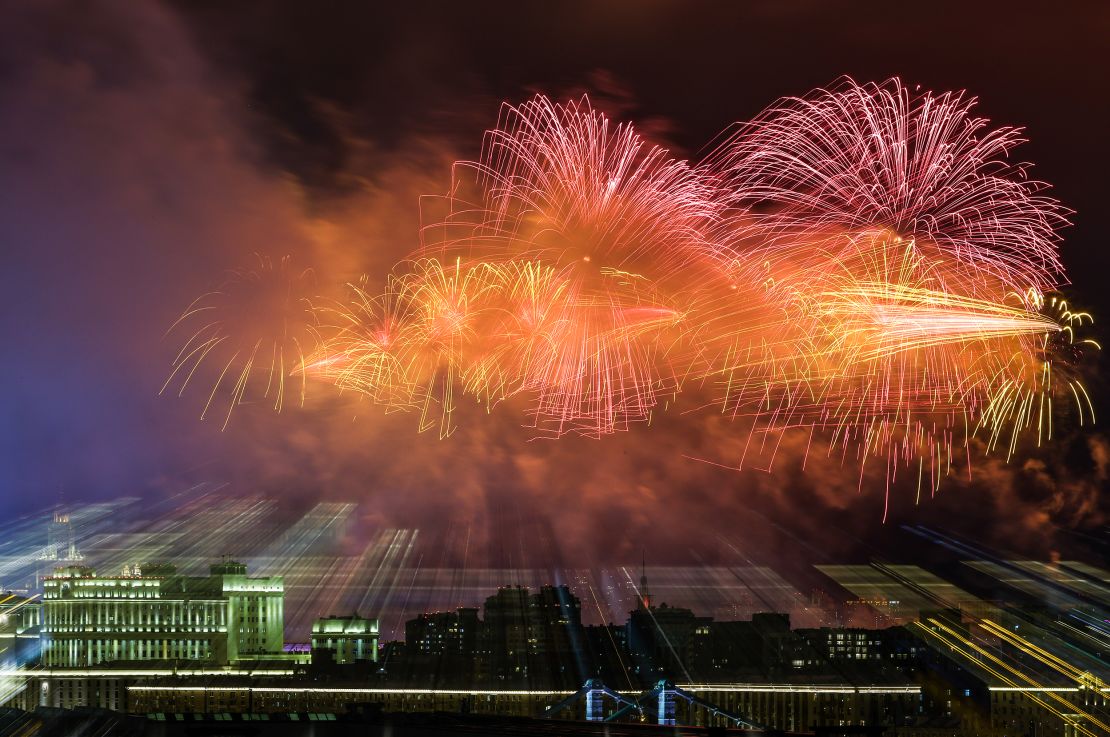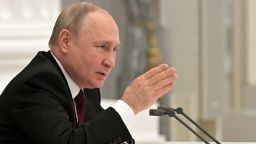There were fireworks in the skies over Moscow Wednesday night, but not for the reasons one might expect.
February 23 marks Defender of the Fatherland Day in Russia, a holiday that officially honors those who have served in Russia’s armed forces, but in practice is known as День мужчин, or Men’s Day – a sort of Valentine’s Day for dudes.
So the fireworks were not in celebration of Russian President Vladimir Putin’s decision to recognize the sovereignty of two breakaway statelets in eastern Ukraine, the Donetsk and Luhansk People’s Republics – and the Russian government’s declared aim to send troops to the separatist-held regions.

Putin attended a wreath-laying ceremony in Moscow to mark the holiday, and delivered a recorded address for the occasion that touched briefly on the current crisis that has set his country on a clear collision course with the West.
“We see how difficult the developing international situation is, what dangers the current challenges pose, such as weakening of the arms control system or the military activity of the NATO bloc,” Putin said. “At the same time, Russia’s calls to build a system of equal and indivisible security that would reliably protect all countries remain unanswered.”
Little was new in those remarks, and it’s worth wondering if Russian troops in the tanks and armored vehicles parked just across the border from Ukraine were getting a different message from their commander-in-chief: the precise start time for the launch of a massive military assault against Ukraine. But if a full-scale invasion of Ukraine does happen, it will likely come as a big shock to Russians. Putin has in recent days and weeks failed to lay the public-relations groundwork for a full-scale war.
Putin’s recent comments on Ukraine speak volumes, and they make it clear the Kremlin leader does not see Ukraine as a legitimate state – and that he views an independent Ukraine as an existential threat. Russian state television has rallied around Putin’s arguments, portraying the residents of the breakaway Donbas republics as being under mortal threat from Ukrainian government forces. Putin himself has described the situation there – loosely, and incorrectly, as a genocide.
But can he expect the kind of surge in patriotic fervor that accompanied Russia’s largely bloodless annexation of Crimea from Ukraine in 2014? That remains to be seen.
In his angry, hour long speech Monday, Putin recited a litany of historical grievances about Ukraine. But he did not say that ethnic cleansing against Russians was happening in Kyiv, or that Russia should mobilize to defend compatriots in Kharkiv, both Ukrainian cities with sizable numbers of Russian speakers.
The Kremlin has presented the Donbas recognition with considerable fanfare: Putin deliberated on the matter in a grand, colonnaded hall with his top security deputies on state television, and the following day, the lower and upper houses of Russia’s parliament approved Putin’s request to recognize the Donbas republics, with unanimous votes and standing ovations from lawmakers.
It was a dismal display of rubber-stamping reminiscent of the Soviet Union’s waning days, when a gerontocratic leadership approved the disastrous invasion of Afghanistan in 1979.
Those historical echoes were not lost on opposition leader Alexey Navalny, who is currently in a penal colony and is facing a new criminal trial after being sentenced to prison for violating parole terms after being medically evacuated to Germany after a nerve-agent poisoning.
In a statement on Twitter, Navalny said the session of Putin’s Security Council reminded him of the “nomenklatura dotards from the Politburo of the Central Committee of the CPSU (Communist Party of the Soviet Union), who, quite similarly, on their own whim, imagining themselves as geopoliticians at the ‘grand chessboard,’ decided to send Soviet troops into Afghanistan.”
Navalny, who says the charges against him are politically motivated, added, “Thanks to Putin, hundreds of Ukrainians and Russian citizens may die now, and in the future, this number may reach tens of thousands. Yes, he will not allow Ukraine to develop, he will drag it into the swamp, but Russia will pay the same price.”
Whether Navalny’s prediction will come true is anyone’s guess, but the theater of the past few days could serve as grim prelude if Putin makes the decision to invade Ukraine – and if he does not get a short, victorious war to sell to the Russian public.

